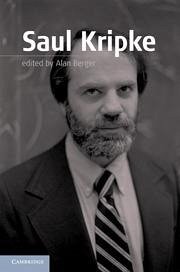Saul Kripke
Herausgeber: Berger, Alan
Saul Kripke
Herausgeber: Berger, Alan
- Gebundenes Buch
- Merkliste
- Auf die Merkliste
- Bewerten Bewerten
- Teilen
- Produkt teilen
- Produkterinnerung
- Produkterinnerung
The most comprehensive analysis of Saul Kripke's philosophy and writings available.
Andere Kunden interessierten sich auch für
![Rethinking Whitehead's Symbolism Rethinking Whitehead's Symbolism]() Rethinking Whitehead's Symbolism122,99 €
Rethinking Whitehead's Symbolism122,99 €![The Philosophy of Life and Philosophy of Language The Philosophy of Life and Philosophy of Language]() Friedrich Von SchlegelThe Philosophy of Life and Philosophy of Language38,99 €
Friedrich Von SchlegelThe Philosophy of Life and Philosophy of Language38,99 €![A Collection of Miscellaneous Essays / by T. Mozeen A Collection of Miscellaneous Essays / by T. Mozeen]() Thomas MozeenA Collection of Miscellaneous Essays / by T. Mozeen32,99 €
Thomas MozeenA Collection of Miscellaneous Essays / by T. Mozeen32,99 €![Wittgenstein on Language and Thought Wittgenstein on Language and Thought]() Tim ThorntonWittgenstein on Language and Thought171,99 €
Tim ThorntonWittgenstein on Language and Thought171,99 €![The Art of English Poetry; 2 The Art of English Poetry; 2]() The Art of English Poetry; 232,99 €
The Art of English Poetry; 232,99 €![Rousseau juge de Jean-Jacques. Dialogues. ... of 2; Volume 1 Rousseau juge de Jean-Jacques. Dialogues. ... of 2; Volume 1]() Jean-Jacques RousseauRousseau juge de Jean-Jacques. Dialogues. ... of 2; Volume 134,99 €
Jean-Jacques RousseauRousseau juge de Jean-Jacques. Dialogues. ... of 2; Volume 134,99 €![The Gentleman's Magazine The Gentleman's Magazine]() John NicholsThe Gentleman's Magazine40,99 €
John NicholsThe Gentleman's Magazine40,99 €-
-
-
The most comprehensive analysis of Saul Kripke's philosophy and writings available.
Produktdetails
- Produktdetails
- Verlag: Cambridge University Press
- Seitenzahl: 382
- Erscheinungstermin: 6. Juni 2011
- Englisch
- Abmessung: 229mm x 150mm x 25mm
- Gewicht: 658g
- ISBN-13: 9780521858267
- ISBN-10: 0521858267
- Artikelnr.: 31080696
- Herstellerkennzeichnung
- Libri GmbH
- Europaallee 1
- 36244 Bad Hersfeld
- gpsr@libri.de
- Verlag: Cambridge University Press
- Seitenzahl: 382
- Erscheinungstermin: 6. Juni 2011
- Englisch
- Abmessung: 229mm x 150mm x 25mm
- Gewicht: 658g
- ISBN-13: 9780521858267
- ISBN-10: 0521858267
- Artikelnr.: 31080696
- Herstellerkennzeichnung
- Libri GmbH
- Europaallee 1
- 36244 Bad Hersfeld
- gpsr@libri.de
Introduction Alan Berger; Part I. Naming, Necessity, Identity, and A
Priority: 1. Kripke on proper and general names Bernard Linsky; 2. Kripke
on vacuous names and names in fiction Nathan Salmon; 3. Kripke on epistemic
and modal possibility: two routes to the necessary a posteriori Scott
Soames; 4. Possible world semantics and its philosophic foundations Robert
Stalnaker; Part II. Formal Semantics, Truth, Philosophy of Math, and
Philosophy of Logic: 5. Kripke models for modal logic and intuitionism John
Burgess; 6. Kripke's theory of truth John Burgess; 7. Kripke on logicism,
Wittgenstein, and de re beliefs about numbers Mark Steiner; 8. Kripke on
the incoherency of adopting a logic Alan Berger; Part III. Language and
Mind: 9. Kripke's new puzzle about belief and our principles of belief
attribution Mark Richard; 10. A note on Kripke's puzzle about belief Nathan
Salmon; 11. Kripke's version of Wittgenstein: some conceptions and
misconceptions George Wilson; 12. Kripke on color words and the primary,
secondary quality distinction Mario Gomez-Torrente; Part IV. Philosophy of
Mind and Philosophical Psychology: 13. Kripke's views on Cartesianism and
naturalism Sydney Shoemaker; 14. Kripke's critique of functionalism Jeff
Buechner.
Priority: 1. Kripke on proper and general names Bernard Linsky; 2. Kripke
on vacuous names and names in fiction Nathan Salmon; 3. Kripke on epistemic
and modal possibility: two routes to the necessary a posteriori Scott
Soames; 4. Possible world semantics and its philosophic foundations Robert
Stalnaker; Part II. Formal Semantics, Truth, Philosophy of Math, and
Philosophy of Logic: 5. Kripke models for modal logic and intuitionism John
Burgess; 6. Kripke's theory of truth John Burgess; 7. Kripke on logicism,
Wittgenstein, and de re beliefs about numbers Mark Steiner; 8. Kripke on
the incoherency of adopting a logic Alan Berger; Part III. Language and
Mind: 9. Kripke's new puzzle about belief and our principles of belief
attribution Mark Richard; 10. A note on Kripke's puzzle about belief Nathan
Salmon; 11. Kripke's version of Wittgenstein: some conceptions and
misconceptions George Wilson; 12. Kripke on color words and the primary,
secondary quality distinction Mario Gomez-Torrente; Part IV. Philosophy of
Mind and Philosophical Psychology: 13. Kripke's views on Cartesianism and
naturalism Sydney Shoemaker; 14. Kripke's critique of functionalism Jeff
Buechner.
Introduction Alan Berger; Part I. Naming, Necessity, Identity, and A
Priority: 1. Kripke on proper and general names Bernard Linsky; 2. Kripke
on vacuous names and names in fiction Nathan Salmon; 3. Kripke on epistemic
and modal possibility: two routes to the necessary a posteriori Scott
Soames; 4. Possible world semantics and its philosophic foundations Robert
Stalnaker; Part II. Formal Semantics, Truth, Philosophy of Math, and
Philosophy of Logic: 5. Kripke models for modal logic and intuitionism John
Burgess; 6. Kripke's theory of truth John Burgess; 7. Kripke on logicism,
Wittgenstein, and de re beliefs about numbers Mark Steiner; 8. Kripke on
the incoherency of adopting a logic Alan Berger; Part III. Language and
Mind: 9. Kripke's new puzzle about belief and our principles of belief
attribution Mark Richard; 10. A note on Kripke's puzzle about belief Nathan
Salmon; 11. Kripke's version of Wittgenstein: some conceptions and
misconceptions George Wilson; 12. Kripke on color words and the primary,
secondary quality distinction Mario Gomez-Torrente; Part IV. Philosophy of
Mind and Philosophical Psychology: 13. Kripke's views on Cartesianism and
naturalism Sydney Shoemaker; 14. Kripke's critique of functionalism Jeff
Buechner.
Priority: 1. Kripke on proper and general names Bernard Linsky; 2. Kripke
on vacuous names and names in fiction Nathan Salmon; 3. Kripke on epistemic
and modal possibility: two routes to the necessary a posteriori Scott
Soames; 4. Possible world semantics and its philosophic foundations Robert
Stalnaker; Part II. Formal Semantics, Truth, Philosophy of Math, and
Philosophy of Logic: 5. Kripke models for modal logic and intuitionism John
Burgess; 6. Kripke's theory of truth John Burgess; 7. Kripke on logicism,
Wittgenstein, and de re beliefs about numbers Mark Steiner; 8. Kripke on
the incoherency of adopting a logic Alan Berger; Part III. Language and
Mind: 9. Kripke's new puzzle about belief and our principles of belief
attribution Mark Richard; 10. A note on Kripke's puzzle about belief Nathan
Salmon; 11. Kripke's version of Wittgenstein: some conceptions and
misconceptions George Wilson; 12. Kripke on color words and the primary,
secondary quality distinction Mario Gomez-Torrente; Part IV. Philosophy of
Mind and Philosophical Psychology: 13. Kripke's views on Cartesianism and
naturalism Sydney Shoemaker; 14. Kripke's critique of functionalism Jeff
Buechner.








